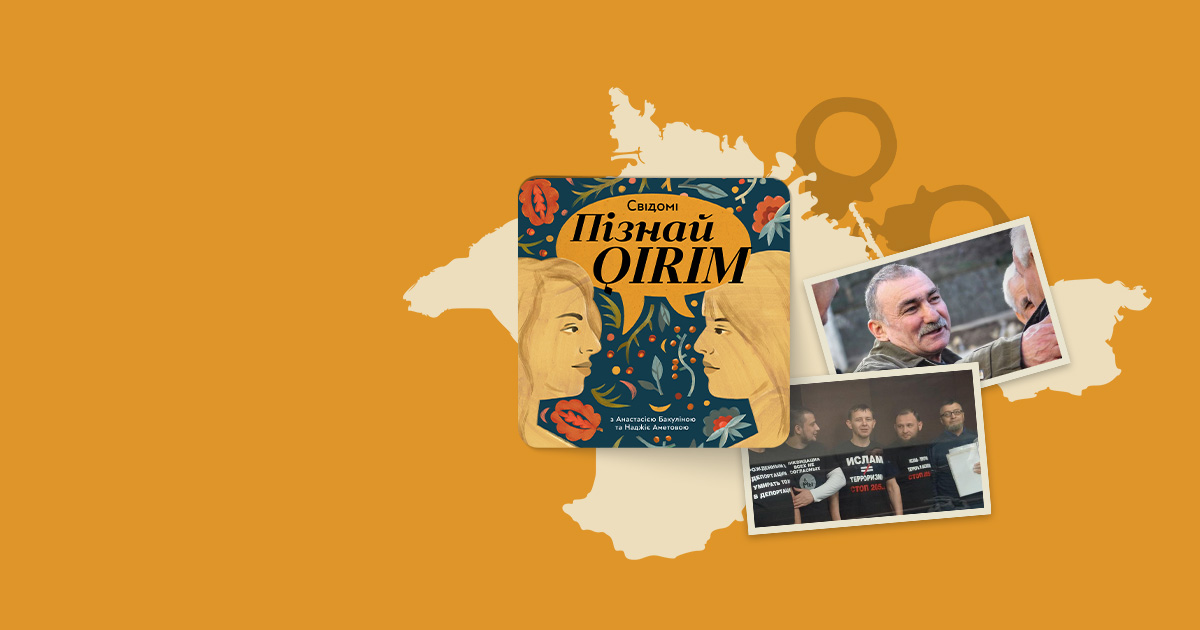Prisoners of the Kremlin

Russia holds approximately 25,000 prisoners of the Kremlin. According to the Ukrainian Parliament Commissioner for Human Rights, Dmytro Lubinets, this is the number of civilians abducted by the Russian Federation. The Mission of the President of Ukraine in the Autonomous Republic of Crimea (Qırım) confirms 218 illegally imprisoned Ukrainian citizens, 134 of whom are Crimean Tatars (Qırımtatarlar).
Today, Crimean Tatars in Crimea are being arrested and imprisoned on charges of extremism or terrorism.
‘The Case of the 25’
The biggest criminal case against Crimean Tatars is the 'Case of the 25'.
In 2019, the FSB (Russian Federal Security Service) charged and prosecuted 25 Crimean Tatars. They were accused of participating in the terrorist organisation Hizb ut-Tahrir (banned in Russia but operating freely in Ukraine and most countries of the world) and preparing to change the administrative structure of the temporarily occupied peninsula.
At the time, 25 people were convicted under one criminal article — 25.5.
Most of those convicted were Crimean activists who helped the families of Kremlin prisoners.
***
Crimean Tatars are detained for gathering in churches, posting on social media or refusing to obtain a Russian passport, as in the case of Lenia Umerova, a 25-year-old Crimean Tatar woman. She has been in Russian custody since December 2022 and was convicted of holding a Ukrainian passport and refusing to obtain a Russian one.
Crimean Tatars are planted with weapons and banned literature, and their cases are 'stitched up' in this way.
Crimean Tatars went missing and were later found tortured somewhere outside the city. Those who came to the courts are heroes. Because in defending one of their values, they sacrificed others — the lives of their families and themselves.
The Russians are afraid, as they were in 1944, that the Crimean Tatars will start fighting for their land and freedom. That's why they come with searches at 4-5 in the morning to intimidate the people.
Najie's father
Najie's father, Kazim Ametov, is one of the first prisoners of the Kremlin. He has been active since his youth, fighting for the return of Crimean Tatars to Crimea (Najie's father was born in Uzbekistan). When he managed to return to the peninsula, he continued his work, attending rallies in Crimea and taking part in the Orange Revolution.
After the rally on February 26, the Russians arrested the head of the Mejlis, Refat Chubarov, and his deputies, Akhtem Chiygoz and Ilmi Umerov, who became the first prisoners of the Kremlin.
Najie's father attended their trials. Later, the FSB began to follow and intimidate those who came to the courthouse.
On November 23, the man was arrested. In the morning, dozens of FSB and riot police cars were parked near Najie's parents' house: no one was allowed inside, and witnesses were brought in by themselves. That day, Russian security forces arrested Kazim Ametov, Asan Chapukh, Ruslan Trubach and Bekir Degermendzhi. They were accused of extorting money from a Turkish citizen - their case is known as the 'Vedzhie Kashka case'.
Najie's father was sentenced to two and a half years in prison and a further year of house arrest. But for five days after the arrest, Najie and the relatives of the other three prisoners did not know where their relatives were.
***
The actions of family members in government-controlled territory can harm relatives in Crimea. This was the case with one family (we do not name names for security reasons): when the daughter was proactive in Kyiv, her parents' house was searched twice.
It is irresponsible to demand certain actions from people under occupation because we cannot understand them until we have lived the same experience.
In 2014, no one stood up for the Crimean Tatars; they did not feel support. They do not feel it now. Maybe they want to talk about freedom and rights, but who will protect them from the occupying authorities?
Our state must stand up for its citizens in the temporarily occupied territories.
Crimean childhood
Today, there is an organisation in Crimea that helps the children of Kremlin prisoners. Mumine Salieva, a mother of four and the wife of a Kremlin prisoner, says that the organisation is currently looking after 254 underage children whose parents are in prison, 15 of whom were born after their father's arrest and have never seen him.
More than 50 of the children suffer from chronic severe illnesses caused by stress and psychological trauma. This is the case of Mumine's four children, who witnessed the searches.
After the searches, Mumine's daughter, who was six years old at the time, developed juvenile idiopathic arthritis. At the age of 13, she has a disability.
After his father's arrest, Mumine's nine-year-old son developed hand tremors due to fear of responsibility.
Children are the least protected from psychological trauma. Hundreds of Crimean Tatar children are growing up with mental illnesses. The Russians are committing a crime against the next generation of an entire people.
Children are the least talked about during searches. All attention is always focused on the accused and the trial itself. And the children's trauma remains 'behind the scenes'. It is essential to draw the attention of international organisations and communities to this problem because the next generation will live and develop Ukraine.


